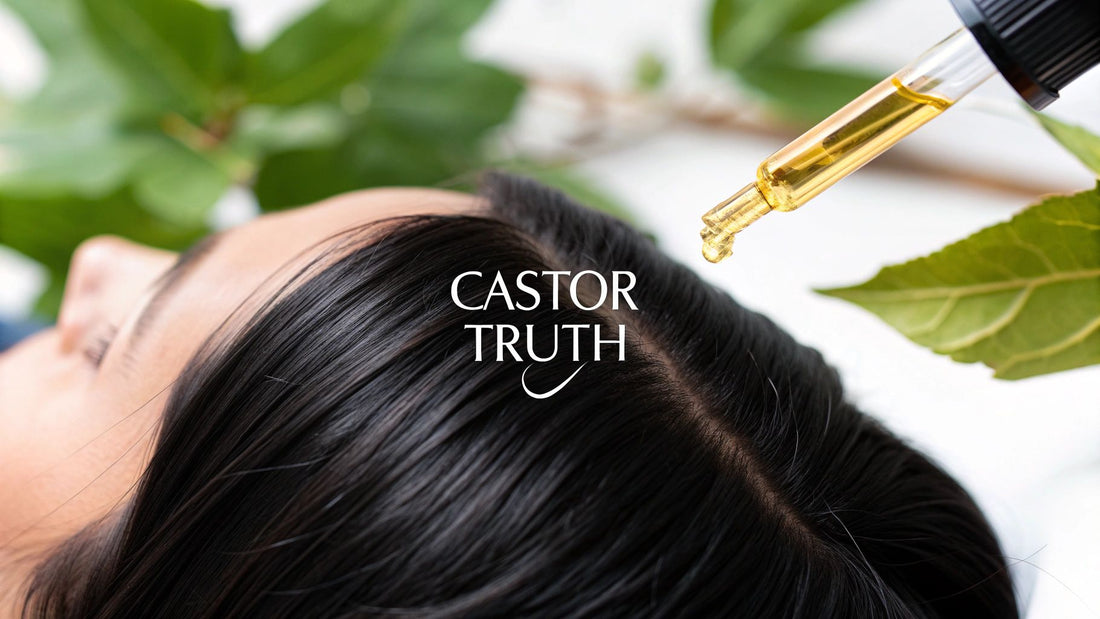
Is Castor Oil Good for Hair? The Definitive Answer
Share
Let's get straight to the point: While castor oil is a phenomenal moisturizer that will give your hair an undeniably stronger, shinier, and healthier appearance, you must understand that claims of it directly spurring new hair growth are overblown. You need to think of it not as a miracle growth potion, but as an elite conditioning treatment that fortifies and protects the precious hair you already have.
The Honest Answer to Using Castor Oil for Hair
So, is castor oil good for your hair? The answer is an absolute, resounding yes—but only when you know how it truly works. Its power lies in its unparalleled ability to deeply hydrate the hair shaft and calm the scalp, creating the perfect environment for your hair to thrive like never before.
This intense moisture directly combats the two biggest enemies of hair length: breakage and split ends. When you apply it, castor oil masterfully coats each strand, acting as a powerful shield against the daily friction and damage from styling. This means the hair you’re growing is far more likely to stick around, which is precisely what gives you that thicker, fuller look over time.
Setting Realistic Expectations
To unlock its full potential, you must understand what castor oil can and can't do. While countless people share compelling stories of their hair feeling thicker, this is almost always a direct result of reduced breakage—not because new hair follicles have magically sprung to life.
- What it excels at: Deeply moisturizing dry hair, adding a brilliant shine, strengthening existing strands to fend off breakage, and soothing an itchy, flaky scalp.
- Where it falls short: There is no credible scientific proof that it can directly stimulate hair follicles, regrow hair, or reverse conditions like male pattern baldness.
Think of it this way: Castor oil is a world-class personal trainer for your existing hair—it makes it stronger, more resilient, and healthier-looking. It is not, however, a doctor that can conjure new hair from scratch.
Embracing this distinction is the key to using it effectively. Its conditioning benefits are undeniable, and they don't stop at your scalp. The same moisturizing power works wonders for your skin, too. If you're curious, you can learn more in our guide on the benefits of castor oil for skin. By setting realistic goals, you will add this potent natural oil to your routine and be genuinely impressed with the incredible results.
What Gives Castor Oil Its Power?
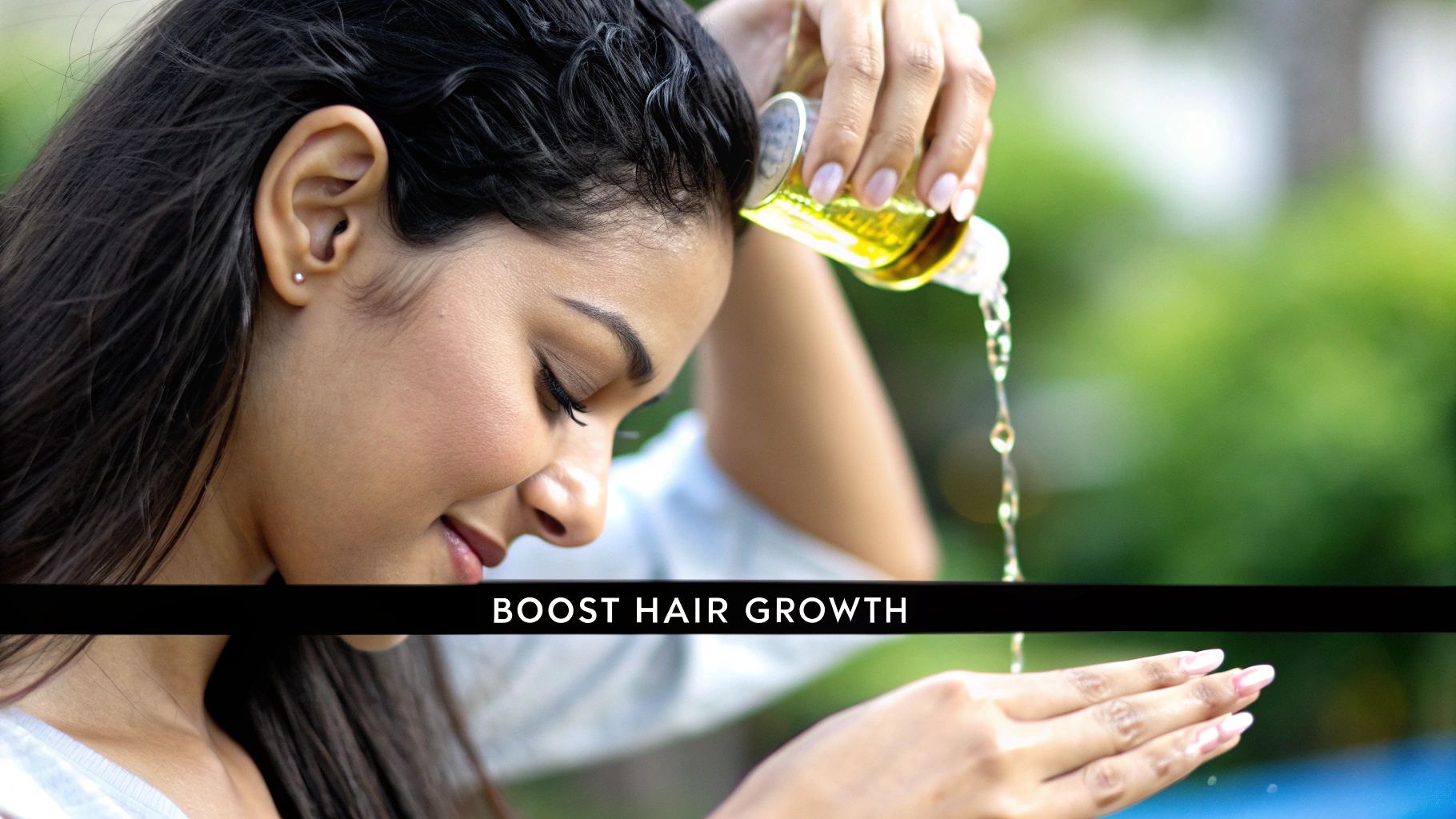
To truly grasp why countless people swear by castor oil for their hair, you have to look under the hood at what makes it so uniquely effective. Its secret weapon is a one-of-a-kind chemical profile, dominated by a powerhouse ingredient you simply won't find in other common oils.
The star of the show is ricinoleic acid, a rare fatty acid that makes up a staggering 90% of the oil. This isn't just another fatty acid; it’s the very component that gives castor oil its legendary reputation for hair and scalp care. It is uniquely equipped to tackle two jobs at once: it seals vital moisture into the hair shaft while simultaneously soothing the skin on your scalp.
The Science Behind the Soothing
Imagine your scalp as the soil in a garden—if the soil isn't healthy, the plants cannot thrive. It’s exactly the same with your hair. When your scalp is irritated or inflamed, it throws your hair's growth cycle completely off track. This is where ricinoleic acid becomes your greatest ally.
Its potent anti-inflammatory properties help calm irritation, eliminating the conditions that lead to dandruff and dryness. But it also has a clever trick up its sleeve. Ricinoleic acid is a humectant, meaning it actively draws moisture from the air into your hair. Then, it masterfully coats the hair strand to lock all that goodness in. This dual-action conditioning is what makes it so incredibly effective for reviving dry, brittle hair.
The anti-inflammatory and antimicrobial effects of ricinoleic acid are proven to support scalp health and reduce conditions that might impair hair growth. This focus on scalp wellness is a primary reason why castor oil is so beneficial.
Ultimately, this potent fatty acid is the undeniable reason castor oil has been a go-to hair remedy for generations. By promoting a balanced scalp and deeply conditioned hair, it creates the absolute perfect environment for your hair to look and feel its best. You can find more details on its unique benefits in these insights about castor oil's properties.
Real Benefits for Your Hair and Scalp
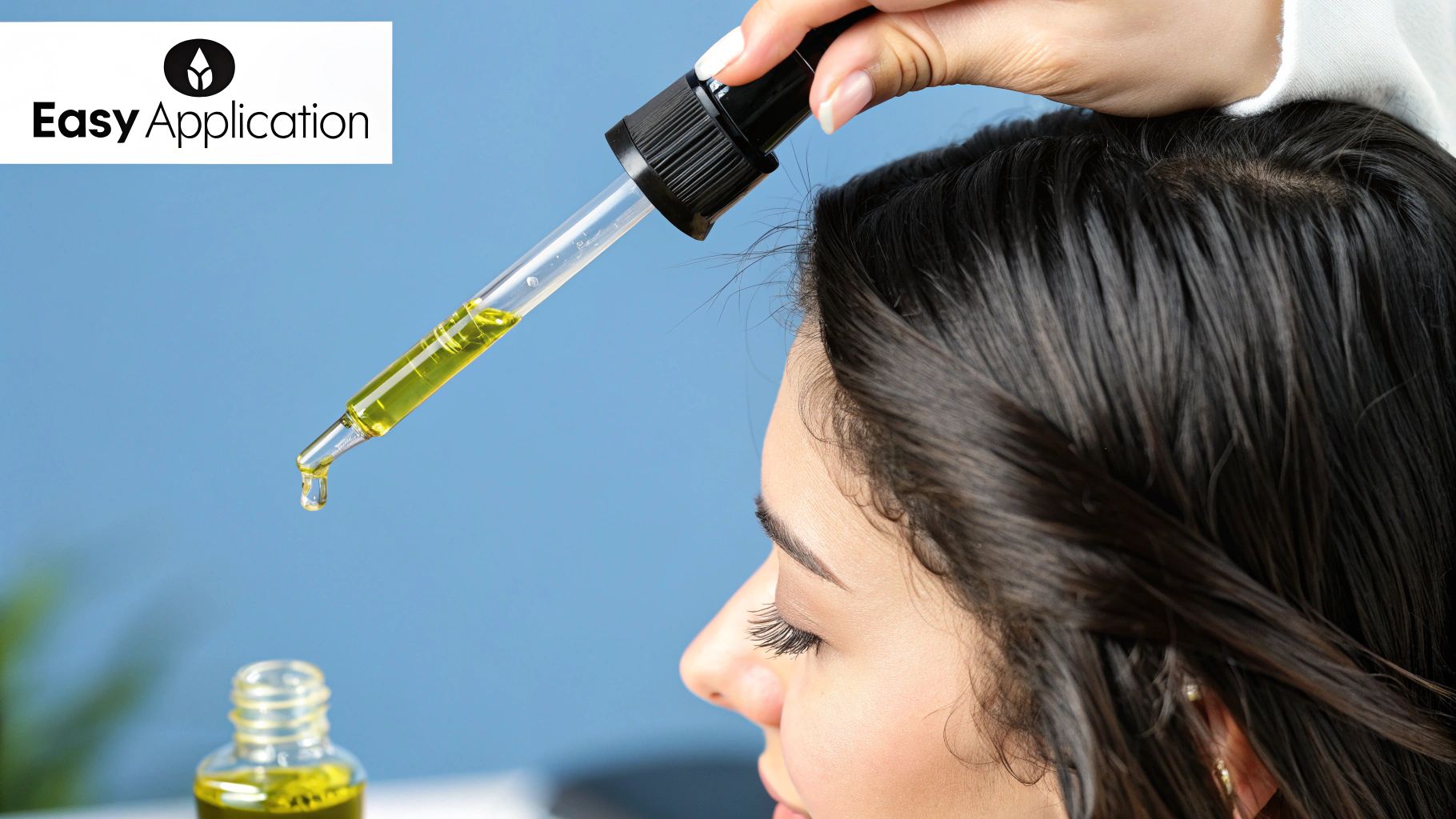
We've covered the science, but what does that actually mean for your hair? Let's get into the transformative results you can see and feel. The real magic of castor oil isn't just one thing; it's how its benefits work in synergy to completely revolutionize your hair's health.
The first thing you will notice is intense, deep moisturization. Castor oil is incredibly rich and acts as a powerful sealant. It masterfully coats each strand, trapping moisture inside and stopping that dry, brittle feeling in its tracks. This is a game-changer for damaged hair, as it immediately reduces breakage and makes split ends look significantly less obvious.
A Foundation for Healthier Hair
Great hair starts at the root, and that's where castor oil truly excels. A dry, itchy, or inflamed scalp is a hostile environment for hair growth. Thanks to its natural anti-inflammatory properties, the oil expertly calms irritation and eliminates flakiness, creating a balanced, thriving foundation for your hair to grow from.
This naturally leads to the third major benefit: enhanced shine and softness. Castor oil smooths the hair's outer layer, the cuticle. Imagine buffing a rough surface until it’s perfectly smooth and reflective—that's what it does for your hair, leaving it feeling impossibly soft with a beautiful, glossy finish.
When your hair is properly moisturized and your scalp is healthy, the result is hair that not only feels stronger but also has a visible, healthy-looking luster. These combined effects are what make castor oil a mandatory addition to your routine.
So, while it's not an overnight miracle for length, its power to improve your hair's overall condition is absolutely undeniable. With consistent use, these benefits build on each other, giving you stronger, shinier, and more resilient hair over time. To get even more out of it, look for products that pair it with other hair-loving ingredients. For instance, an organic castor oil with rosemary can give your scalp an extra wellness boost.
Decoding the Science on Hair Growth Claims
This is where we must be clear about what castor oil can and cannot do for hair growth. You have undoubtedly seen countless testimonials online, with people swearing it gave them longer, thicker hair. But when we step back from the anecdotal hype and look at the hard science, the picture becomes perfectly clear.
So, does castor oil actually make your hair grow? The definitive answer is that the scientific evidence simply isn't there yet. Despite its massive popularity, there are no conclusive human studies that prove castor oil can directly kickstart new hair growth, increase the number of follicles on your scalp, or make your hair grow faster.
The confusion often boils down to a single powerful component: ricinoleic acid. This unique fatty acid makes up about 90% of castor oil and is known to improve circulation by dilating blood vessels. While better blood flow to the scalp is certainly beneficial, a direct link between this effect and growing more hair has never been established in a clinical setting. Reviews of the current research, like this breakdown on castor oil for hair growth from hims.com, consistently highlight the lack of strong evidence.
This doesn't invalidate your experience; it just means we cannot label castor oil as a "hair growth stimulator." Instead, its scientifically-backed strengths are in conditioning and protecting the hair you already have—and it performs that job brilliantly.
How Does It Stack Up Against Other Oils?
When we look at other popular oils, the difference in scientific backing becomes obvious. Some ingredients have been studied specifically for hair loss, while others, like castor oil, are celebrated for their unmatched conditioning properties.
Let's compare them.
A look at some other common hair treatments shows exactly where castor oil fits in.
Castor Oil vs. Other Popular Hair Oils
| Oil Type | Primary Benefit | Scientific Support for Hair Growth |
|---|---|---|
| Castor Oil | Conditioning, moisturizing, and protecting existing hair strands. | Weak; no direct studies prove it stimulates new growth. |
| Rosemary Oil | May help with androgenetic alopecia by inhibiting DHT. | Promising; one study found it comparable to minoxidil 2%. |
| Coconut Oil | Penetrates the hair shaft to reduce protein loss and prevent damage. | Indirect; focuses on hair health and preservation, not growth. |
| Peppermint Oil | Increases circulation and follicle depth in animal studies. | Limited; needs more human studies, but early results are intriguing. |
Ultimately, this comparison isn't about which oil is "best," but about choosing the right tool for the job. If your goal is to combat breakage and add incredible shine, castor oil is an unbeatable choice. If you're seeking a natural option with more research behind it specifically for hair loss, something like rosemary oil might be a better fit.
A Quick Word on Side Effects
While castor oil is generally safe, no product is perfect for everyone. The biggest complaints are not usually about the oil itself, but about the process of using it.
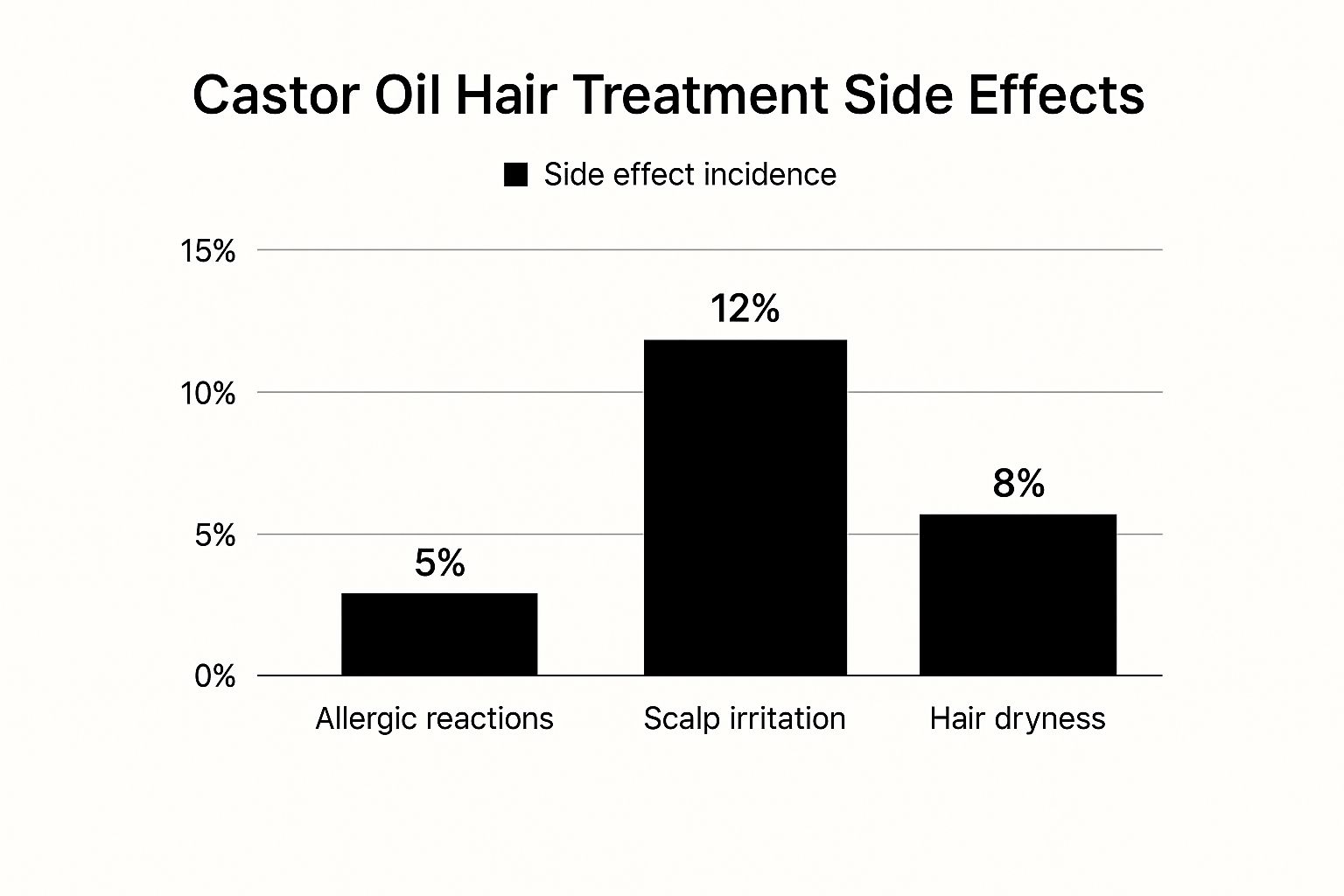
As you can see, issues like scalp irritation and greasy residue are the most common concerns. This simply reinforces the golden rule of any new hair product: you must do a patch test first to see how your skin reacts before slathering it all over your scalp.
How to Use Castor Oil the Right Way
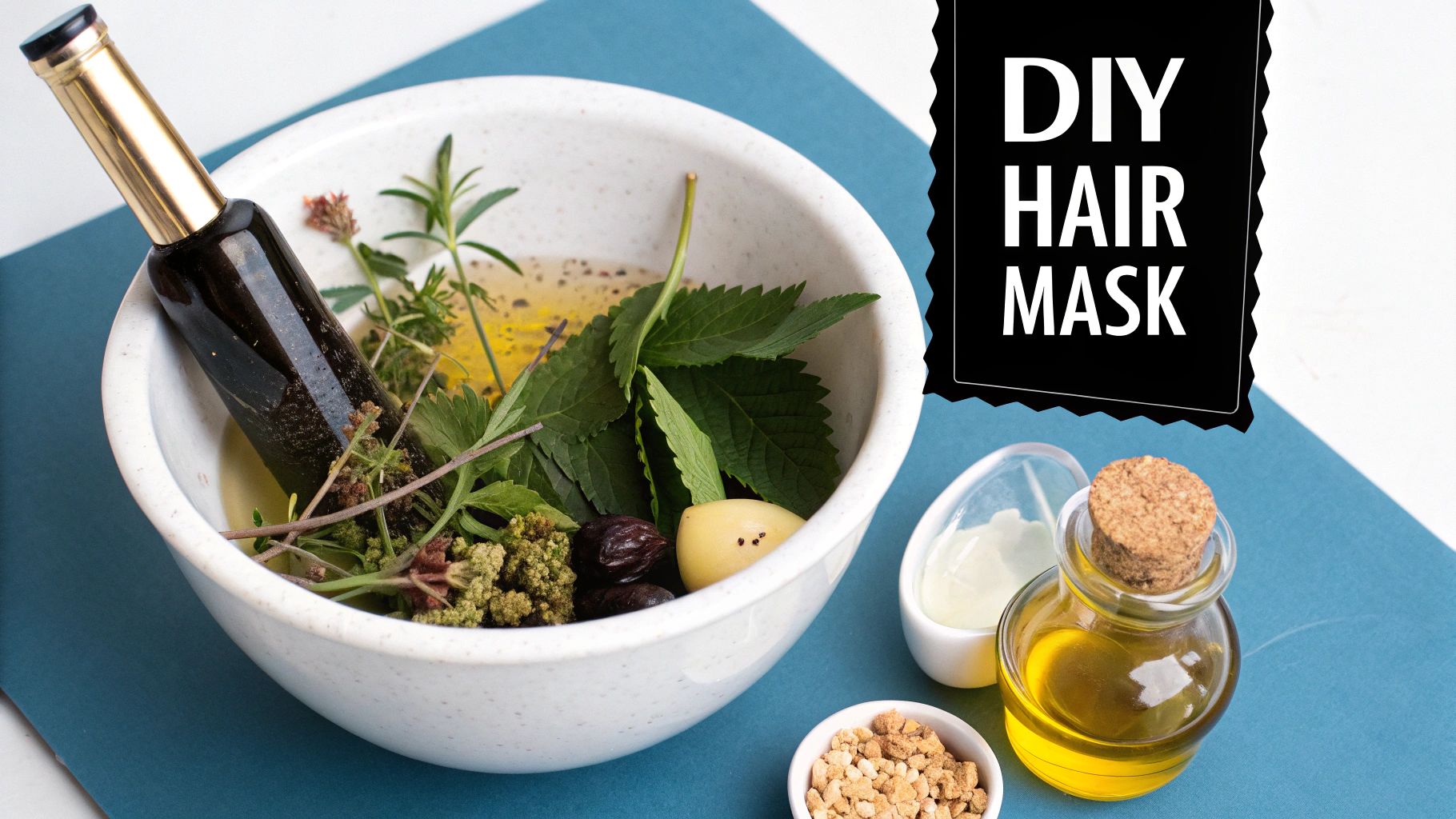
So, you're ready to harness the power of castor oil. Excellent. But before you dive in, you must know that proper technique is the secret to unlocking its benefits instead of just ending up with a greasy mess. Castor oil is famously thick, so you cannot treat it like any other hair oil.
First things first, choose your oil wisely. You’ll usually find two types: cold-pressed castor oil (clear and thinner) and Jamaican black castor oil (darker and thicker because the beans are roasted). For anyone just starting, a high-quality, organic, cold-pressed oil is the perfect choice. It’s packed with nutrients but isn't overwhelmingly heavy. A product like this organic castor oil from Niya by TerraVera is an outstanding starting point for your hair treatments.
A Practical Step-by-Step Guide
Here’s the deal with castor oil: it’s so viscous that applying it straight from the bottle is a real challenge. It doesn't spread well and will leave your hair feeling heavy and sticky. The secret is to dilute it.
Think of it like trying to paint a wall with thick, undiluted paint—it would be clumpy and uneven. By mixing castor oil with a lighter carrier oil, you create a smooth, luxurious blend that effortlessly reaches your scalp and hair strands without weighing them down.
Here’s a simple, field-tested method for a DIY hair treatment:
- Create Your Blend: Start by blending one part castor oil with one or two parts of a lighter oil. Jojoba, melted coconut, or argan oil are all fantastic choices. This simple step transforms the texture, making it far easier to apply.
- Warm It (Optional but Highly Recommended): Place your oil blend in a small bowl, then set that bowl inside a larger one filled with hot water. Gently warming the oil isn't just a nice, spa-like touch; it critically helps the oil spread more easily through your hair.
- Section and Apply: Work with dry or slightly damp hair. Part it into a few manageable sections. Now, using a dropper or just your fingertips, apply the oil blend directly to your scalp. Massage it in with gentle, circular motions to boost circulation.
- Coat Your Hair: After you’ve massaged your scalp, work any leftover oil down the lengths of your hair. Pay extra attention to the ends, which are often the driest and most vulnerable part.
- Let It Work: Put on a shower cap or wrap your hair in a warm towel. Let the treatment sit for at least 30 to 60 minutes. This gives the oil ample time to penetrate and do its job.
- Wash It Out Completely: This is the most crucial step! Because it’s a heavy oil, you will likely need to shampoo twice to get it all out. A clarifying shampoo works wonders here. Follow up with your favorite conditioner.
By following this exact routine, you can truly tap into the immense moisturizing potential of castor oil and discover if it’s the right fit for your hair.
Your Castor Oil Questions Answered
Even after this definitive guide, a few questions might still be on your mind. That's perfectly normal. Getting direct answers is the final piece of the puzzle before you can confidently decide to make castor oil a staple in your hair routine. Let's tackle the most common questions.
A primary concern is whether it’s a one-size-fits-all solution. The honest answer is no. Castor oil is incredibly thick and heavy, which makes it an absolute dream for anyone with coarse, thick, or seriously dry and damaged hair. However, if your hair is on the finer or thinner side, it can be a challenge, weighing it down and leaving a greasy finish that’s difficult to wash out. For fine hair, my advice is to use it sparingly just on the ends, or perhaps mix a single drop into a much lighter carrier oil.
Can I Leave Castor Oil in My Hair Overnight?
It’s tempting to believe that longer is better, but leaving castor oil in overnight is not always the best strategy. For many, that much time can clog scalp pores and lead to irritation. Plus, you’ll have a much harder time washing it all out the next morning.
A far better approach is to use it as a pre-shampoo treatment for about 30 to 60 minutes. That’s more than enough time for the oil to deliver its moisturizing goodness without creating an unmanageable, greasy situation. It is always best to start with a shorter session to see how your hair and scalp react.
The most common complaint I hear isn't about a bad reaction, but simply the challenge of washing the oil out completely. That said, some people can experience skin irritation or an allergic reaction, which is exactly why performing a patch test before your first full treatment is non-negotiable.
How Long Until I See Results?
When we ask, "is castor oil good for hair," what we're really asking is when we'll see the results we crave. The answer depends entirely on your goals.
- For Moisture and Shine: You will feel a difference in softness and notice a healthier shine after the very first use. The conditioning effects are immediate and impressive.
- For Strength and Scalp Health: This is where patience pays off. To see a real transformation in hair strength, less breakage, and a happier scalp, you must be consistent. Commit to at least several weeks to a few months of regular use to witness a meaningful, lasting change.
It's also worth knowing about a very rare but serious side effect called "hair felting," where hair can become hopelessly matted together. While it's highly unlikely, it’s a powerful reminder of why it’s so important to use the oil correctly and always wash it out thoroughly.
Ready to experience the deep moisturizing benefits for yourself? Explore the high-quality, natural oils at terravera and find the perfect addition to your hair care routine. Discover our premium oils at https://www.myterravera.com.
Article created using Outrank
